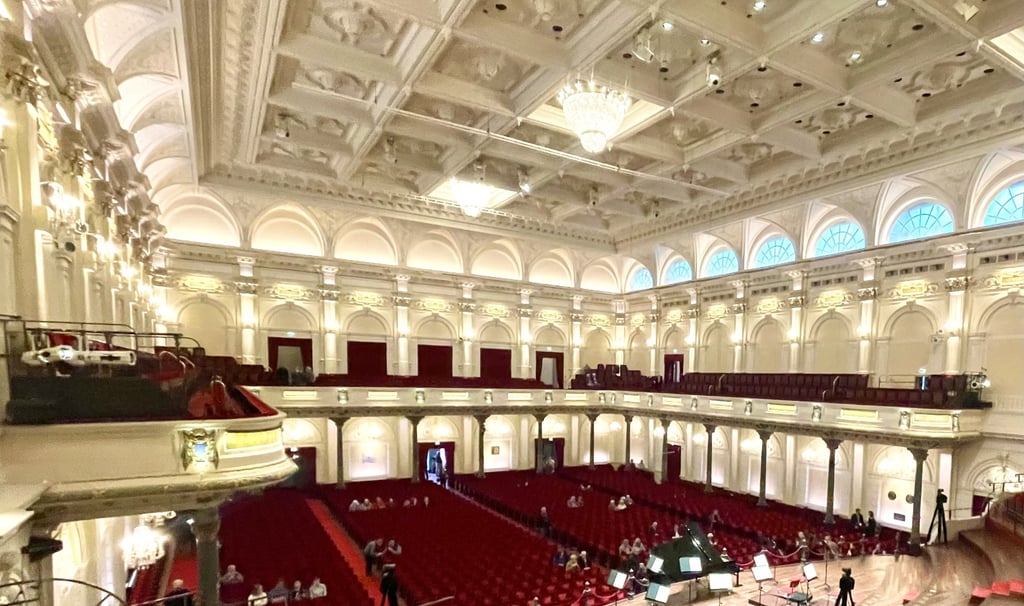Leonskaja and Mozart with Tchaikovsky
A musician's review of a concert at Amsterdam's Concertgebow on March 12, 2023
FD Alexander
3/14/2023


It was a grey spring morning concert on March 12, 2023 at Amsterdam’s Grand Concertgebouw, presented under the “Sunday Morning Concert” series. The hall felt almost sacred in its quiet, stately beauty: lofty ceilings, warm wood, soft lighting, and the hush of anticipation in the audience. The Concertgebouw’s acoustics, long praised for their clarity, warmth, and balance, seem always to hold their breath, waiting for the first note.
For my wife, daughter and me, coming fresh from travel, there was something magical in entering the hall: an immersive sensory shift from the streets of Amsterdam into a world of sound. To my daughter, unaccustomed to the ritual of classical concerts, the moment the lights dimmed and the musicians took their places must already have felt momentous.
The evening’s program was elegant and contrasting:
Mozart: Piano Concerto No. 12 in A major, K. 414 (with Elisabeth Leonskaja at the piano)
Tchaikovsky: Souvenir de Florence in D minor (arranged for string ensemble)
Elisabeth Leonskaja, by now a venerable figure in European piano life, brought with her a reputation for introspection, nuanced touch, and great expressive control. The chamber ensemble was a leaner complement of the Concertgebouw strings, so the focus on clarity and transparency would be more evident.
From the first bars of the concerto, Leonskaja projected an understated brilliance. Her touch was light but articulate, never heavy-handed. In Mozart’s K. 414, Mozart himself described the piece as a “golden middle way between too heavy and too light” (a “gulden middenweg”), a balance that Leonskaja seemed deeply attuned to.
It may have been the first time my daughter heard Mozart not just as “classical music,” but as conversation, instruments leaning in, listening, responding. To hear Leonskaja’s mature restraint and expressive depth in Mozart would be an ideal introduction: not overwhelming, but full of life.
If one were to quibble, the outer movements might have felt a little conservative in tempo. Some listeners might have wished for a slightly more daring edge, but given the setting and the delicate balance of piano plus chamber strings, the interpretive humility is defensible.
Tchaikovsky’s Souvenir de Florence is originally a string sextet, a work of rich contrapuntal textures, Russian lyricism, and, when taken at full volume, robust drama. Here it was arranged for a larger string ensemble (though still modest compared to a full symphony orchestra).
This work provided a grand contrast to the lighter Mozart, acting as a bridge to the wider world of Romantic orchestral sound while still in a chamber setting. For my daughter, the shift would have felt like stepping into a larger landscape, with more dramatic horizons.
If anything, in its most intense passages the ensemble might not quite match the full-throated force one would hear from a full orchestra, but within the constraints of the arrangement and hall acoustics, the result likely felt both powerful and refined.
What made this evening especially memorable was its layering of “firsts.” For my daughter, the experience was multi-dimensional. I, as her guide, would have seen her attention wax and wane, perhaps leaning forward at pianissimo moments, perhaps startled or amazed at sudden surges of dynamics. I shared glances with her in the dark as a chord resolved or a passage surprised.
This concert was, in many ways, a gentle yet profound welcome to the world of classical music. Leonskaja’s maturity, restraint, and expressive depth made Mozart sing without flashiness, and the Tchaikovsky gave a glimpse into more dramatic textures while still preserving clarity and balance. The Concertgebouw’s hall held it all warmly, letting detail and resonance thrive.
It was an afternoon of shared wonder: the first live music she’s ever immersed in, and a first European Spring Break memory anchored in sound. It’s not often that a “first concert” feels right in magnitude: not overwhelming, but deeply real, and I hope she carries that feeling with her, to listen again and again.